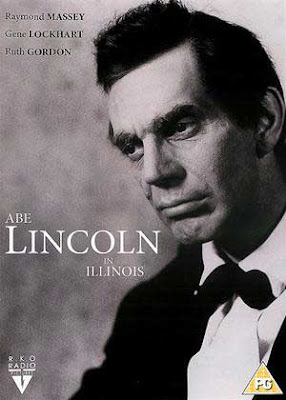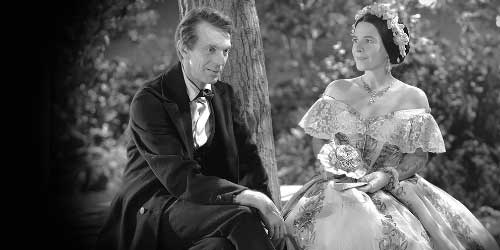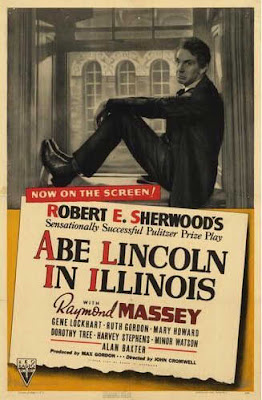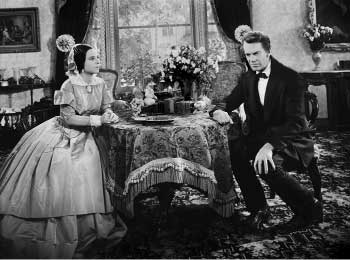Old Abe Lincoln came out of the wilderness,
out of the wilderness, out of the wilderness. His truth is marching on.
This very fine bio-pic covers Lincoln's life from a young man leaving his
log cabin home to leaving for Washington DC to take on the duties of the
Presidency with the civil war looming ahead of him. But I don't know if any
of the historians and certainly these films I have watched of late can really
get to the heart of him. He is a historical enigma. Where did his greatness
come from. Where did his endurance come from. Where did his ambition come
from. His wisdom. His toughness. So little in his life prior to becoming
President prepared him for this, anticipated this. He was a small town boy
who loved trading jokes and stories, was constantly filled with self-doubt,
often fell into depressions, had few political ambitions and sort of floated
along on the tide going out. I think these films over do that aspect of him
though - he ran for various offices from his 20's on, he was actually a topnotch
lawyer who argued in front of the Illinois Supreme Court many times and certainly
never said no to the Presidency. But still. He had to send hundreds of thousands
of boys to their death for an ideal. The survival of the union. Only a little
over 80 years at the time. How is any man prepared for that His fellow Republicans
thought he would be easy to out maneuver, easy to influence - he was a hick
from the sticks. They found out differently. He had greatness thrust upon
him and held on through astonishing adversity and anguish.

Raymond Massey portrays Lincoln. He had done so in the play this film is
based on and continued playing him on radio and films. After a while you
feel like you are watching Lincoln. His slow pattern of speech but his electrifying
speeches, his moments of doubts, his undying love for a woman, not his wife
whose death never left him. The film spends a lot of time on Lincoln the
man with no flourishes, no hints of greatness. But of course, we know it
is there. He leaves home to transport pigs to New Orleans and meets Ann Rutledge
(Mary Howard) while carrying a pig. He settles in New Salem where she lives
and loves her from a distance because she is engaged. He finally professes
his love for her when it appears that her fiancé has moved on. And
then she dies. He becomes a lawyer, runs for political offices, meets Mary
Todd from a wealthy Kentucky slave owning family. She sees great potential
in him and feels that all he needs is a push from her. He proposes and then
breaks it off and then goes back. As in most films about Lincoln, she is
not treated well - a demanding bitter woman (diagnosed now as likely bi-polar).
She is played by Ruth Gordon in her debut and is quite wonderful - you dislike
her immediately and that never eases.

Some of the film can feel plodding - how much detail do we really want about
his domestic life - his life seems aimless, he feels a failure, he runs for
office but usually loses. Then with the Lincoln-Douglas debate for Senator
the film takes on a purpose, takes on energy - mainly because of two speeches
that Massey gives with Lincoln's own words - the A House Divided Cannot Stand
speech at the debate and then his farewell speech to Illinois as he boards
a train - looking 30 years older, the responsibility already crushing him
and already mourning what has to come. It is a magnificent moment because
it is true and so is Massey at that moment. This turned out to be a financial
disaster for RKO perhaps coming too soon after Young Mr. Lincoln in 1939
with Henry Fonda.




